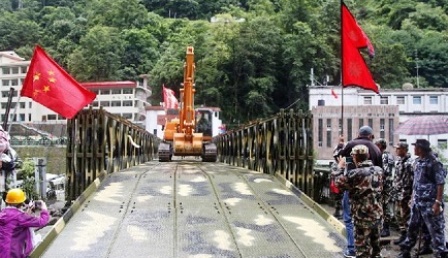 By Shristi Kafle
By Shristi Kafle
SINDHUPALCHOWK, Nepal, April 24 (Xinhua) –Tatopani border point, the major gateway between Nepal and China, resumed its operation a week ahead of the first anniversary of the devastating earthquake which struck Nepal on April 25 last year, bringing new hopes among the Nepalese business community.
At the border point located at 114 km away from the capital city, nearly 300 stranded containers carrying Chinese goods have started to moving into the Himalayan country.
Till Thursday evening, a total of 88 trucks loaded with garments, electronic items, shoes and slippers, food items, among others, had crossed the Sino-Nepal Friendship Bridge to the deserted Tatopani area.
“This border point is a lifeline for thousands of traders and locals of SIndhupalchowk district, who are solely dependent upon cross-border trading and tourism. So, we are expecting it to be opened permanently”, Dibya Raj Pokharel, customs chief at Tatopani, told Xinhua on Thursday.
Before the devastating earthquake, the customs point at Tatopani used to witness a flow of 100 containers every day with a revenue of around Rs 6 billion annually.
Due to the extensive damages by the 7.9-magnitude quake, the Nepalese government has not only lost billions of Rs through tax, but also failed to assure the business community about the regular flow of imports and exports with the northern neighbor.
Nearly 2, 000 traders under the Nepal Trans Himalayan Association are of of the view that the border point must function permanently to sustain their livelihood. But the border is only opened for a temporary period now.
Bihsnu Bahadur Shrestha, vice president of the Nepal Trans Himalayan Association told Xinhua ” The Road linking the border with the capital has already been repaired whereas infrastructures are in operating form. Our only demand is the cross-border trading should be resumed as normally as before.”
Hundreds of traders, loaders and drivers have gathered at the border area since last week to clear their consignments. Though there is no exact calculation of stranded goods, it is believed that goods are worth Rs 2 billion.
Though the Chinese side has cleared the customs process of the stranded trucks, they are still stranded in the Nepalese side amid the lack of financial institutions. Several commercial banks that used to operate at the border area before the quake have not resumed their service.
According to customs officials, banks are taking a wait-and-see policy and are not in mood of taking risks as the border point is not operating in a permanent form for the time being.
As a result, the traders have to verify their documents and pay necessary tax amount through Kathmandu branches. It is taking unnecessary time for the clearance of goods and the traders have to pay unnecessary expenses.
Rajendra Shrestha, who is dependent upon border trading for the past 16 year, said to Xinhua “I have been here for the last 10 days to clear my consignments. I travelled to Kathmandu thrice for tax clearance through the bank but my truck has not been passed. I need to bear all expenses of the drivers and loaders. It’s quite expensive”.
The major Chinese town near Tatopani border is Zhangmu, locally known as Khaasa, located at 9 km from the Friendship Bridge. Most of the Nepalese traders have set up offices in Khaasa for their business.
Under this situation, many traders have to clear their consignments through Rasuwagadhi border point in the past months. However, they complained that Rasuwagadhi border point cannot be the alternative to Tatopani.
They said that doing business through a completely new place like Kerung, 26 km from Rasuwagadhi border point, is not feasible.
“Rasuwagadhi cannot sustain a big flow of trading. It is far from Kathmandu so the transportation cost will be high. Also, there are no infrastructures at Kerung to support big trading. Security of goods and vehicles is not guaranteed. So, Tatopani is our only solution,” Shrestha added.

